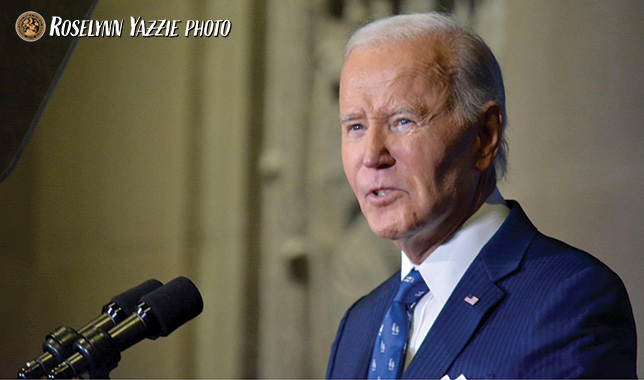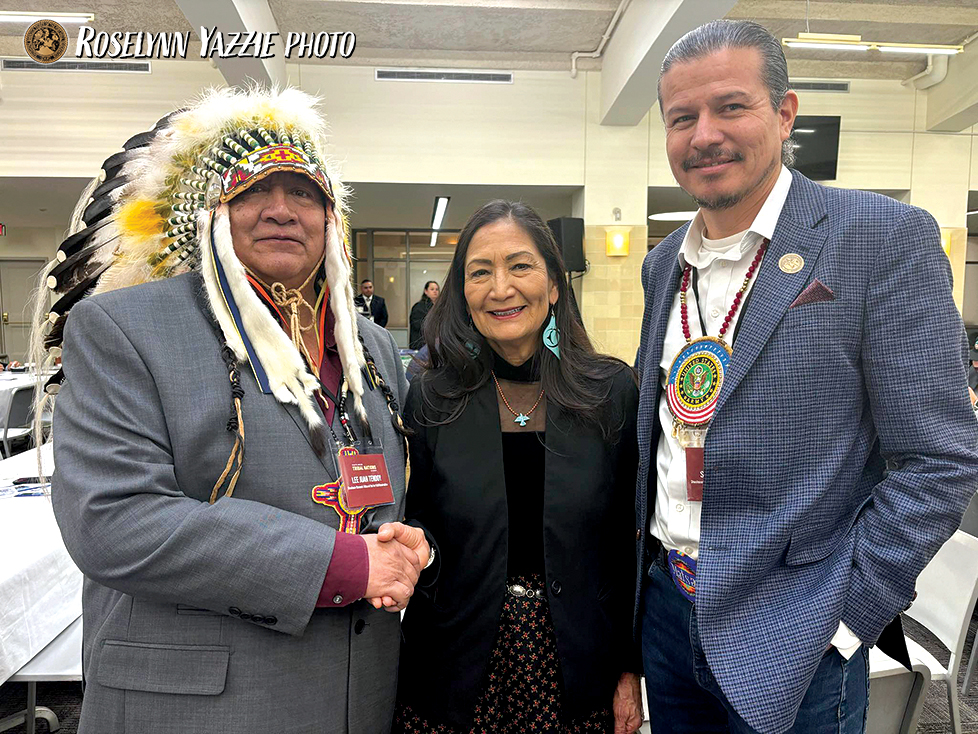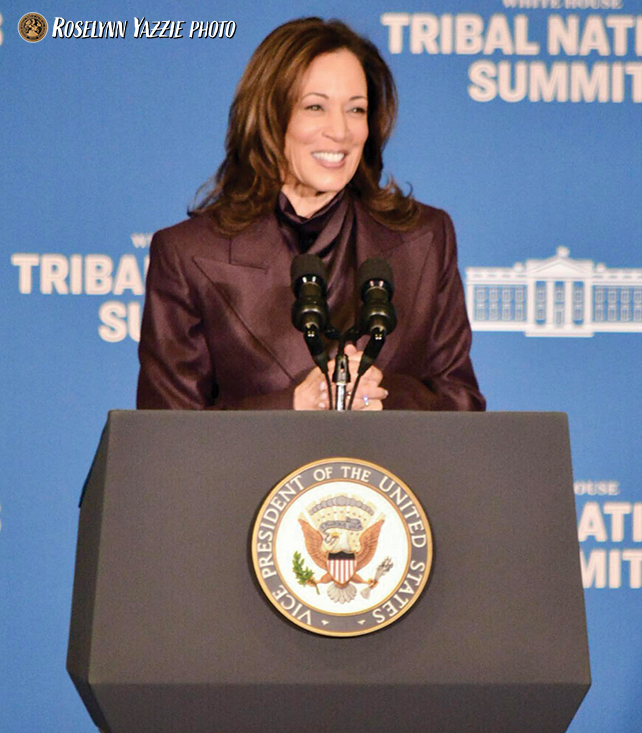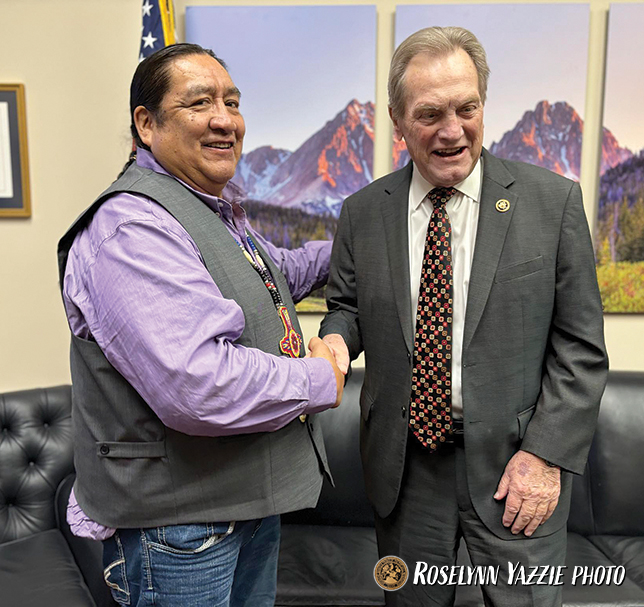Biden-Harris Administration hosts final White House Tribal Nations Summit

Tribal leaders in front of the Department of the Interior in Washington D.C. on December 9.
By ROSELYNN YAZZIE
Office of Public Affairs
WASHINGTON D.C. — Throughout his term, President Biden was dedicated to strengthening the Nation-to-Nation relationship by hosting Tribal leaders at his fourth and final 2024 White House Tribal Nations Summit on December 9 at the Department of the Interior.
The White House Tribal Nations Summit started with the Obama Administration and didn’t happen under Trump. The event allows the administration to meet with tribal leaders from the 574 federally recognized tribes, hear issues in Indian Country, and work towards improvement.
The Shoshone-Bannock Tribes were represented by Fort Hall Business Council (FHBC) Chairman Lee Juan Tendoy and Councilman Sammy Matsaw, Jr. During their visit, they also met with Representative Simpson, Senator Crapo, and Senator Risch and attended the NCAI/Gaming Association Meeting, the White House Initiative Convening on Indian Education, and the Forest Service.

U.S. President Joseph R. Biden Jr. speaks at the annual White House Tribal
Nations Summit.
In her opening remarks, U.S. Department Secretary of the Interior Deb Haaland talked about the progress of the Biden-Harris administration in their work with tribes to foster tribal sovereignty, self-determination, and prosperity.
She mentioned the 50th anniversary of the Indian Self-Determination and Indian Education Assistant Act giving Tribes the right to make decisions for the well-being of their people. Even throughout the difficult times of relocation, termination, boarding schools, underfunding, and neglect.
“Well, my friends and family, a half-century later, we are still here, charting our own course. And together, with the Biden-Harris Administration, we have made extraordinary accomplishments for Indian Country, progress that would make our trailblazing ancestors proud.”

FHBC Chairman Lee Juan Tendoy and councilman Sammy Matsaw Jr. with U.S. Secretary of the
Interior Deb Haaland.
Haaland urged Tribes to focus on the progress made in Indian Country going forward and stated, “Transitions are disruptive, regardless of how we might feel about one leader or another. That’s true on Tribal councils, and it’s true in Washington.”
Through her term as Secretary of Interior, she launched the Federal Indian Boarding School Initiative, which inspired the Road to Healing journey, created an oral collection of first-person narratives from boarding school survivors, and will help in preserving and sharing them.
This work resulted in President Biden’s formal apology to address the brutality endured at residential boarding schools.

Vice President Kamala Harris speaks to tribal leaders.
Other Biden-Harris administration highlights included:
Enhanced involvement in land management decisions, entering into 400 co-stewardship agreements with Tribes.
Historic funding from President Biden’s Investing in America agenda to projects supporting Tribes and their access to critical resources.
Infrastructure Law that implemented 2.5 billion through the Indian Water Rights Settlement Completion Fund.
Awarding 1.4 billion in contracts to Indian-owned and controlled businesses, through the Buy Indian Act.
Launching the Tribal Community Vision Partnership, which will raise and deploy $1.2 billion to impact tribal communities for development, new clean energy opportunities, and support small Native businesses.
Haaland leaves her position inspired and empowered by all they accomplished together and is proud to serve an administration where Indian Tribes had a true seat at the table.

FHBC Chairman Lee Juan Tendoy and Rep. Simpson.
Haaland told Tribal leaders they needed to stay engaged and refuse to let anyone disrupt the progress they made.
“Like our ancestors who made previously unimaginable feats possible, we must never back down,” she said.
Throughout the day panels were given on Investing in Indian Country and Strengthening the Nation to Nation relationship. Remarks were also given by Director of the White House Office of Intergovernmental Affairs Tom Perez; White House Domestic Policy Advisor Neera Tanden, Vice-President Kamala Harris, and President Joseph R. Biden Jr.
President Biden announced two new actions at the White House Tribal Nations Summit, including designating the Carlisle Federal Indian Boarding School National Monument and implementing a strategy towards Native language preservation and revitalization.
“Part of the tragedy of Indian boarding schools is that they deliberately tried to erase the culture of tribes by ensuring that children lost their language and their traditions,” Biden said. “That’s why the next chapter of healing requires revitalizing Native languages.”
Another item he talked about was he will be to make it easier for Tribal nations to receive a disaster declaration.
President Biden
Secretary Haaland and Bryan Newland, Assistant Secretary of the Interior for Indian Affairs, presented President Biden with an Eighth Generation blanket honoring his work for Tribal nations.
“He has been a champion for Indian Country over these past four years,” said Haaland.
President Biden exited the stage and shook hands with tribal leaders, one of them was FHBC Tendoy.
Tendoy said his attendance at the conference was important to connect with other Tribal leaders as they did in the past. It’s a good reminder to the President of the treaties and the federal government’s trust obligations to tribes.
“Looking at him face to face is more than letters, so he can see the emotions of how they’re feeling and see the compassion they have for the love of their people and they want to help them,” he said.
Tendoy was proud to represent along with the other tribal leaders and was happy to wear his warbonnet for the occasion.
Tendoy said all these years he’s been on the council he’s learning something every day to help the people and meeting with other tribes helps him stay up to date and share knowledge among one another.
His thoughts on the new administration are that the people have gone through all kinds of administrations and have dealt with what has come their way.
Chairman Tendoy said the Native people have strong prayers and spirituality to protect them.
“We made it this far, through genocide and atrocities, we’re still here,” he said.





